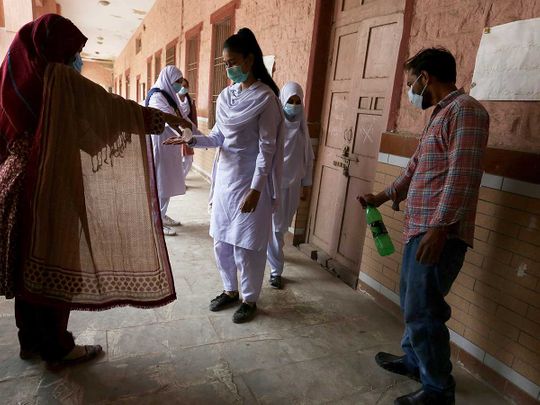
Islamabad: Pakistan is currently grappling with the highest positivity rate since the first coronavirus case was reported in late-February. The positivity ratio in the country is reported to be 7.46 per cent, according to data from the National Command and Operation Centre (NCOC), the organisation leading the nation’s fight against the virus. Nearly 19 per cent out of the total cases were reported in educational institutions, leading to the closure of all schools, colleges and universities from November 26 till January 10.
Nearly 3,000 cases reported in one day
Pakistan recorded 2,954 coronavirus cases on November 23 – the highest since July. The virus claimed 48 lives in the last 24 hours, taking the country’s virus death toll to 7,744. The most alarming aspect is that the number of active cases that reduced to less than 6,000 in September has now reached 40,379 on Tuesday. As many as 267 ventilators were occupied across the country out of 1,803 reserved for coronavirus patients, the officials said.
Sindh: 1,322
Khyber Pakhtunkhwa: 333
Balochistan: 36
Islamabad: 537
Gilgit Baltistan: 16
Kashmir: 80
Kashmir reported the highest positivity ratio of 11.45 per cent, followed by Khyber Pakhtunkhwa at 9.85 per cent, Sindh 9.63 per cent, Islamabad 8.09 per cent, Balochistan 7.73 per cent and Gilgit-Baltistan 5.23 per cent. Punjab reported the lowest positivity ratio at 3.95 per cent.
Second wave more lethal
Pakistan Medical Association (PMA), which represents country’s top health professionals, has urged the public to take strict precautionary measures. PMA Secretary General Dr Qaiser Sajjad said that the second wave was “more lethal” during which the infected people were developing severe symptoms and many have lost their lives. “Large political and religious gatherings have led to the drastic rise in cases with many doctors and paramedics getting infected,” he said.
Doctors complain about lack of PPEs
Lack of personal protective equipment (PPEs) and inadequate facilities in the public hospitals is affecting Pakistan’s response to COVID-19, healthcare workers have complained. PPE supplies in hospitals in the country are not sufficient and “if the situation deteriorated, most healthcare workers would not be available [to treat patients] as the doctors would themselves be in quarantine”, warned Dr Sajjad. He urged the government to ensure availability of PPEs to medical professionals on urgent basis as the burden on the hospitals in increasing every day.
Demand increase in testing
Healthcare professionals have demanded that the government increase coronavirus testing capacity to “at least 25,000 tests daily in every province” to effectively fight the second wave of coronavirus. Pakistan is currently conducting an average of 34,000 coronavirus tests per day in the month of November.








